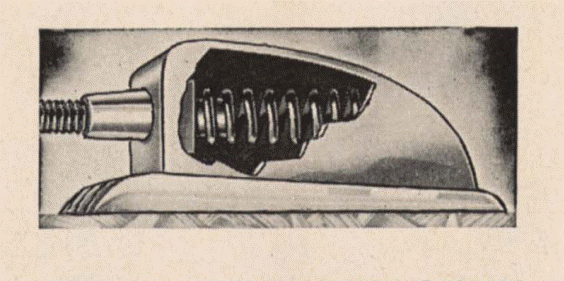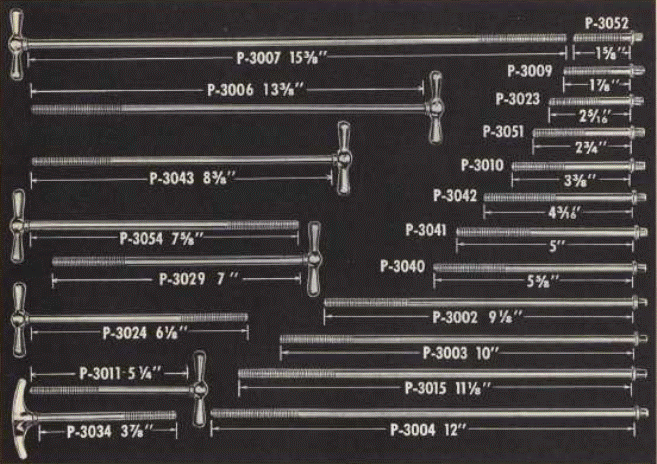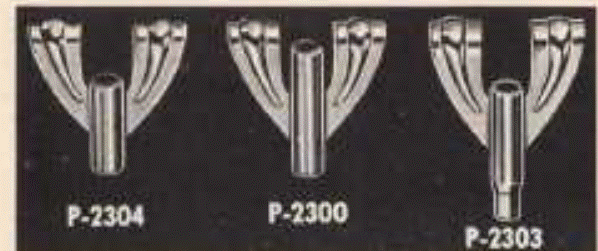Cooper’s Vintage Drums
LUDWIG LUGS
1923-1965

Like most other drum companies
during the early 1920’s, The Ludwig & Ludwig Drum Company used standard tubular
lugs on their snare drums.


Bass drums
of the 1920’s and early 1930’s used long tube lugs as well as single and double
center support studs.





During the 1930’s, a somewhat primitive
lug was used on tom toms.

The use of tube lugs would
remain unchanged until 1935-1936, when Ludwig (now owned by G.C. Conn)
introduced their new “Imperial” or “Streamline” snare drum lug casing.
Considered by many to be the most elegant lug ever designed, the Imperial
tension casing incorporated a beautiful and majestic art deco design. Like the
original Slingerland Streamline lug, it too had the
threads tapped directly into the metal casing and suffered from the same thread
design flaw as the Slingerland Streamline lug from
that era. Ludwig & Ludwig still used the aforementioned tom tom lugs until around 1939. The Imperial lugs were not
incorporated into bass drum design until around 1937-1938.
1936 Ludwig & Ludwig Catalog
showing the Imperial lug

1936 Ludwig & Ludwig Silver
Anniversary model
This unbelievably rare snare drum is an
engraved Deluxe version of the Silver Anniversary
model.
From the
Mike Curotto collection


Nickel plated version


By 1937, the lug was given an
internal spring and swivel inserts similar to those of Slingerland
and Leedy. This beautiful lug would see continual use
throughout the next decade and a very similar version is still in use today.
1937 Ludwig & Ludwig
Imperial Lug with threaded inserts and spring


The
Imperial lug was also used on bass drums and tom toms in the late 1930’s.
Single as well as double ended lugs were offered. A backing plate was usually
installed between the lug and the shell. Bass drums were equipped with either
standard length lugs or extra long versions.






A very long, double ended
version of the Imperial lug was also offered for Ludwig’s top of the line bass
drums starting around 1937. (This long lug was still in use in the 1960’s-70’s
on concert models)
1930’s extra long Ludwig & Ludwig
Imperial bass drum lug



Center support studs were still used on some
single tension bass drum models like the Artist’s Model and Pioneer Model.

“PLASTIC” LUGS
In 1939, Ludwig & Ludwig
experimented with Bake-Lite (early plastic) lugs on their “Modern Bi-Tone
drums”. These lugs came in a few different colors and contained metal interior
parts. The Bake-Lite outer cover was just a façade. The Bake-Lite lug was quite
fragile and this “experiment” did not last long! Very few examples exist today.
1939-1941 Bi-Tone Bake-Lite lug






MODERN BI-TONE DRUM SET


Around 1940, a new lug was
designed and was offered as a less expensive option. This lug was called the
Airline Tension Casing and was also used by Leedy
during the same time. It was used on Timbales, and single headed tom toms. Leedy used the Airline casing on some snare drum models
(see Leedy Lugs).
AIRLINE TENSION CASING

1940-41 CATALOG

World War Two and Ludwig &
Ludwig
Like Slingerland
and Leedy, Ludwig & Ludwig had to adapt to the
WWII metal restriction order and produced some interesting drums during that
period. The “Victory” line was launched featuring solid maple lugs.

1943 Ludwig & Ludwig
Victory Models with wooden lugs and hoops




For more information on drums made during World
War Two, please visit: WWII DRUMS
……………………………………………………………………………………………………………………………………………………………………………………………………………………..
POST-WAR LUDWIG

After the war was over, drum
production gradually resumed and the post-war drums were basically the same as
the early 1940’s products with no major hardware changes. Below are some images
from the first post-war 1948 catalog:





Ludwig & Ludwig continued the use
of the old tube lugs on their lower-line “Artist” drums.



LUDWIG MERGES WITH LEEDY
In 1950, C.G. Conn’s two drum
divisions were merged to form the Leedy & Ludwig drum company. The “new” Leedy & Ludwig drums were mainly Leedy
drums with a few Ludwig & Ludwig hardware pieces. Being that both lines
were manufactured by the same company, this is not surprising. The old classic
Imperial lug was relegated to lower line drums like the Reliance model snare
drum.

1951 LEEDY &
LUDWIG RELIANCE MODEL






Knob Tension Drums
In 1951 a new revolutionary
line of drums called the “Knob Tension” drums was launched. These Knob Tension
drums employed a unique tensioning system in which the need for tension casings
(lugs) was eliminated. By turning a series of knobs mounted on the shell,
internal mechanical parts exerted pressure on the drum heads from within. While
this design may have been a great concept, in actual practice it was less than
spectacular. The overly complicated design proved to be fragile and many of the
parts would fail. Thus, the Knob Tension drums proved to be a failure and never
caught on with drummers of the early 1950’s. In the 1954 Leedy
& Ludwig catalog, the Knob Tension line is noticeably absent. The Knob
Tension “debacle” definitely contributed to the demise of the Leedy & Ludwig Drum Company.






After 24
years in the drum manufacturing business, G.C. Conn decided to sell their
entire drum division, which included Ludwig & Ludwig, as well as Leedy. In 1954-55, the Leedy name
was purchased by the Slingerland Drum Company and
Ludwig & Ludwig was acquired by William F. Ludwig, owner of the W.F.L. Drum
Company. Under the direction of William F. Ludwig, the drums of the new Ludwig
Drum Company were basically W.F.L. drums with a different name on the old
Keystone badge.


During the 1950’s, Ludwig used
three different types of tension casings on their snare drums. The “Streamline”
lug pictured below was offered on all of their six and eight lug snare drums
with the exception of the “Jazz-Combo” and “Down Beat models. These two snare
drums utilized a unique horizontally mounted lug called the “Be-Bop”.
Early 1960’s Ludwig Super
Classic snare drum with separate tension “Streamline” lugs

“Jazz- Combo” with six specially
designed horizontal “Be-Bop” tension casings

“Symphonic” Model featuring 16
“Classic” tension casings

All top of the line Ludwig bass
drums and tom toms were fitted with “Classic” tension casings, with the
exception of large concert models and lower line, budget priced Club Date
models. The Club Date drums had the Streamline snare drum lugs mounted on the
center of the drum shell.
Super Classic Tom Tom with Classic tension casings


Oddly,
Ludwig did not offer a metal shell drum until around 1959-60. At that time, the
venerable Imperial lug was again brought out for use on what would become one
of the most successful snare drums in history- “The Ludwig Supraphonic”.
1960’s Supraphonic
snare drum with ten Imperial lugs

Below
are the various bass drum rods and claws that were used by Ludwig from the
1920’s through the 1960’s.






CONTENTS:
LUGS
STRAINERS
DRUM FINISHES
MISCELLANEOUS
RETURN HOME
O CONTINUE OR RETURN TO ANY OTHER SECTION IN THIS GUIDE OR TO
RETURN “HOME”, CLICK ON A LINK BELOW…